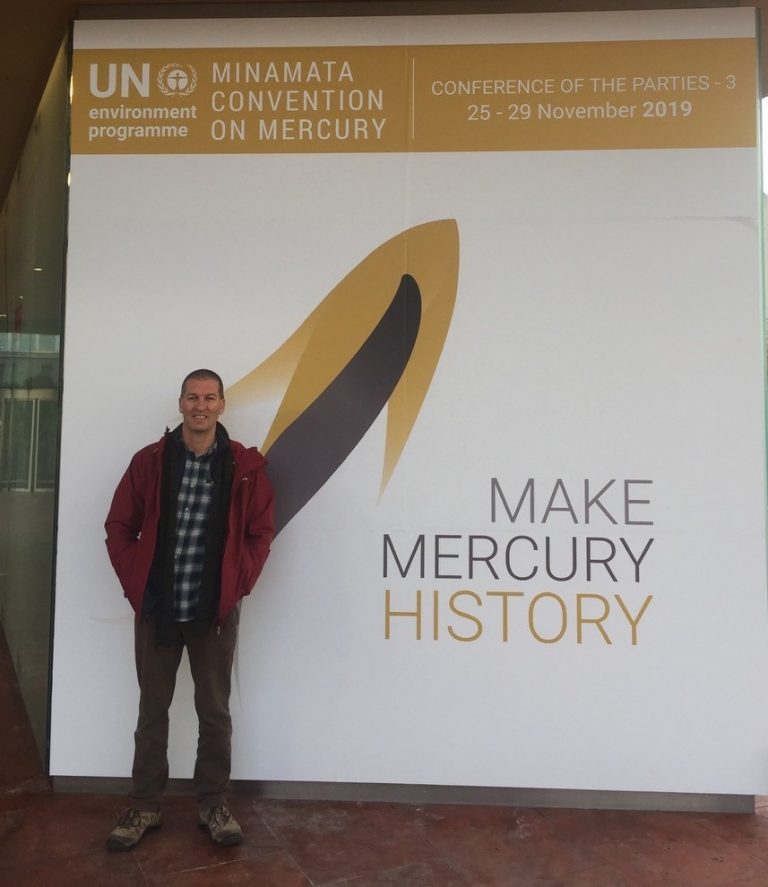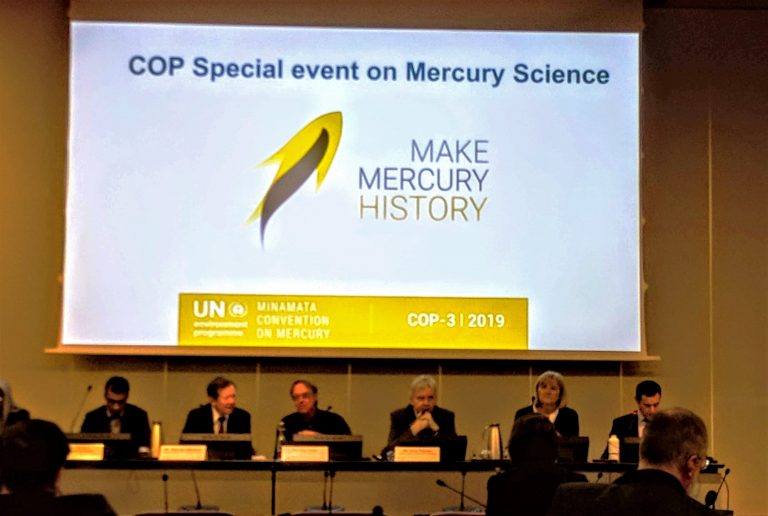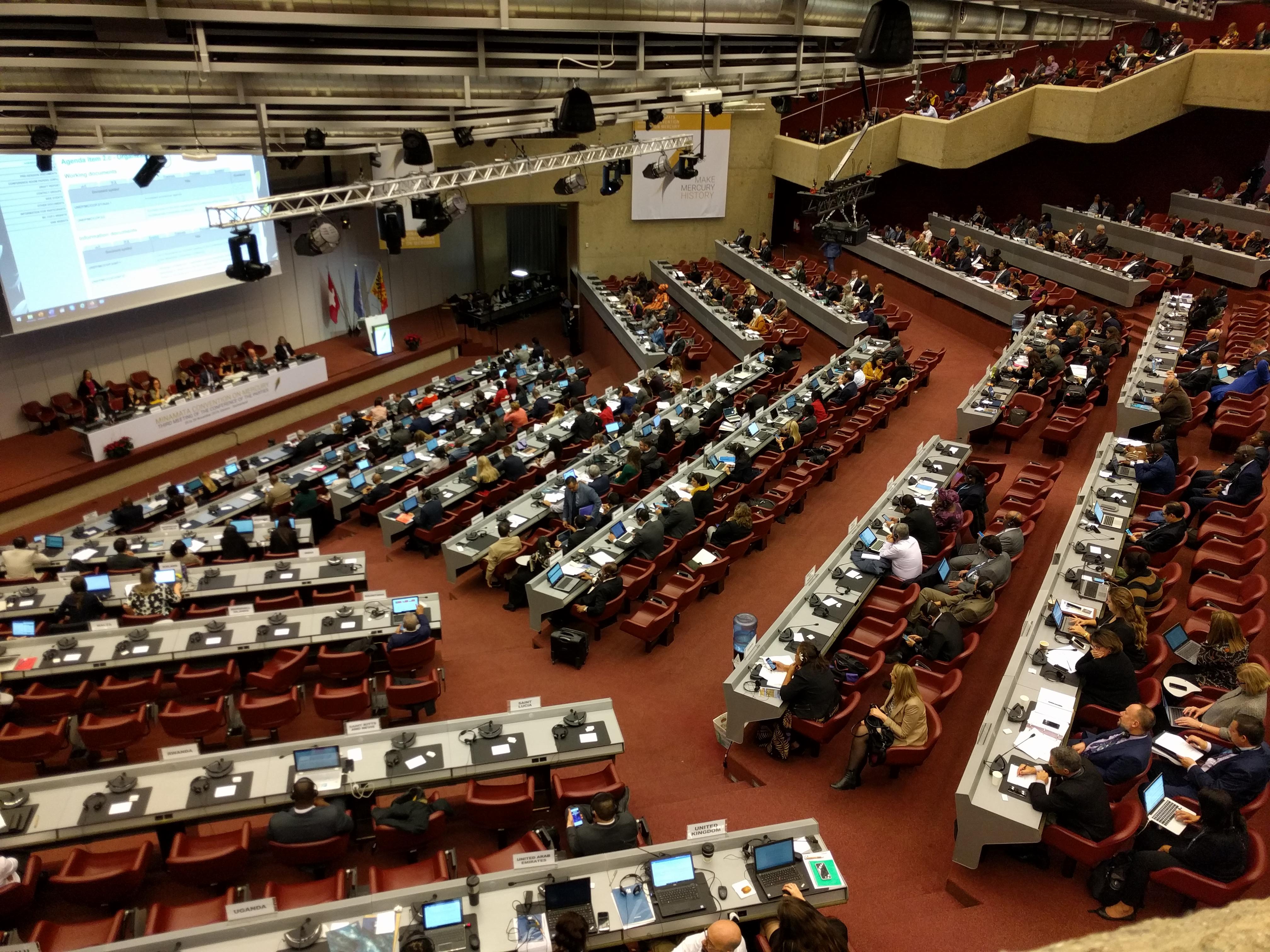Mercury Australia members Dr Larissa Schneider, Associate Professor Darren Sinclair and Professor Peter Nelson had the opportunity to be part of the Conference of the Parties (COP3) of the Minamata Convention, in Geneva. The COP3 started on the 25th November and lasted for a week.
At the opening of COP3, Indonesia announced very specific and ambitious goals in their opening statement, including, for example, a full ban of dental amalgams by 2020 and the retrofitting of coal-fired power stations with best available technology by 2025.

Hot topics were artisanal and small-scale gold mining and the management of dental amalgams. The negotiations on dental amalgams was an energetic topic as a consequence of economic and cultural differences between countries. Some parties voiced concerns about existing mercury free substitutes because of their limited longevity. Others believed that further emphasis on technology transfer needs to be taken into consideration due to the difficult training and cost of dentistry, especially in developing countries. Most parties were keen to phase out mercury usage in dental care, but there was no agreement on the time to do this. The debate became more heated when the NGOs were invited to take the floor. Speakers highlighted the safety of dentists and their clients to encourage funding for additional research and technology transfer. On this topic, the President of the COP3 wisely noted that “perfection is the enemy of progress, improvement can come later. The parties need guidance now”.
A key issue that will require collaboration between parties is mercury waste management. Developing countries will need support to put in place mercury waste management, which requires advanced technology and careful controls. There is a potential role for Australia here in supporting Pacific Islands. Although Australia is not (yet) a party to the Minamata Convention, this issue also relates to the Rotterdam and Basel Conventions, to which Australia is a party.
In the Plenary session, one of the issues to be addressed was the creation of a joint secretariat to cover the Minamata Convention together with the Basel, Rotterdam and Stockholm Conventions (BRS). The EU proposed that the BRS secretariat and Minamata secretariat unite. The US and Brazil opposed the idea of a joint secretariat, arguing that autonomy is critical for the conventions. One area where good progress was made was in the establishment of a harmonised system of codes which would allow countries to regulate the international mercury trade.
During the Convention several side events occurred. The COP Special Meeting on Mercury Science, hosted by the Japanese Government, had the participation of researchers from Brazil, Japan, Slovenia, and Canada, and was open for discussion with the audience. Of great interest was the environmental justice angle of mercury raised by Niladri Basu from the McGill University in Canada. There was a call to develop affordable technology to work with mercury so several countries in the world can collaborate with data, instead of having a few developed countries producing data that generates hot-spots of knowledge rather than an even distribution across the world.

Dr Basu also mentioned the importance of collaborating with countries that do not have strong English language skills in order to make local knowledge accessible worldwide. He also presented a map showing the lack of data from much of the world presented in the recent UN Global Mercury Assessment meeting. Notably, Australia and the Pacific represented the biggest geographic gap in relation to knowledge on mercury. This finding highlights the importance of Mercury Australia in helping to overcome this knowledge gap and contribute to the GMA.
Of note to travel weary Australians was the decision that Indonesia will host COP4 meeting of the Minamata Convention. A video was played during showing Bali and the convention centre where they were proposing to host COP4. Colombia was also interested hosting COP4, but deferred to Indonesia’s bid. This provides a great opportunity for members of Mercury Australia to participate in the next Conference of the Parties (set to be hold on the 31st October to the 5th of November, 2021).
During the convention, Mercury Australia members Dr Schneider and Associate Professor Sinclair had the opportunity to meet the representatives of the Commonwealth Department of the Environment and Energy to talk about ways to increase knowledge on mercury in Australia and to integrate our research efforts with global goals and decisions.
By Larissa Schneider and Darren Sinclair


Twitter